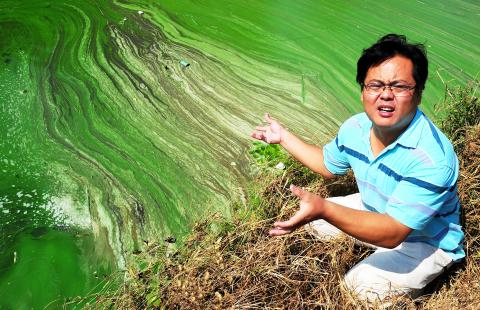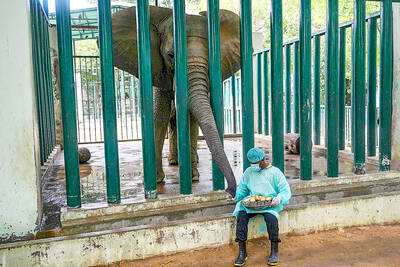Prominent environmental activist Wu Lihong (吳立紅) plunges his hands into a thick layer of toxic green scum and brown foam floating on one of China’s biggest freshwater lakes.
Despite a two-decade battle to clean up the once-scenic Lake Tai that earned him three years in jail, Wu says the water still “stinks” from pollution.
“There’s no place in China that isn’t polluted. There’s no place in China that’s clean,” said Wu, 43, who called himself the “guardian of Lake Tai.”

Photo: AFP
Lake Tai lies on the border of the eastern provinces of -Zhejiang and Jiangsu in one of China’s richest regions, once known as the “land of fish and rice,” and is still a source of drinking water for the heavily populated area.
However, after three decades of explosive economic growth and lax enforcement of environmental protection laws, the lake — like most waterways in China — is heavily contaminated with toxic waste from surrounding factories and farms.
Wu, who remembers swimming in Lake Tai as a boy, started -campaigning to clean up the water in the late 1980s.
The former engineering equipment salesman has paid a high price for his environmental crusade, losing his job in 2001 and landing him in jail a few years later as his one-man battle embarrassed and angered local officials.
His once-portly frame has thinned somewhat and his black hair is speckled with white, which Wu attributes to his time in prison.
“There are only a few people like me making a fuss, but I’m not afraid,” said Wu, who was jailed in 2007 for extortion.
Wu has long proclaimed his innocence and said he was set up by the government of his native Yixing City, which was eager to protect the booming local industry from pollution controls.
Shortly after his arrest, a toxic algae bloom in Lake Tai contaminated water supplies for more than 2.3 million people in Wuxi City, which sits across the lake from Yixing, drawing nationwide attention to the issue.
Many of Wu’s supporters said the toxic pollution, which turned large parts of Lake Tai a murky green, should have led to the -activist’s release.
Wu was finally freed last year and was immediately ordered by police to stay quiet or “we will make you disappear.”
Authorities, anxious about the power of online social networking sites to organize protests, have also blocked Wu from accessing the Internet.
His rural home is constantly monitored by security cameras, he is routinely followed when he goes out and is not allowed to work.
However, Wu says he is undeterred, especially after discovering that the water quality of Lake Tai improved little during his time in jail despite government efforts to crack down on surrounding factories.
In its annual report last year on the country’s water quality, China’s environmental protection ministry gave Lake Tai its lowest rating.
Under China’s water quality classification system, that means the lake is “essentially useless” and can’t even be used for agriculture or landscaping, according to a World Bank report.
Wu accuses local officials of protecting factory bosses, who evade detection by discharging pollutants at night, trucking waste to other sites or channeling contaminated water into hastily dug ditches.
“They are too greedy,” Wu said of the officials willing to turn a blind eye to the pollution in the pursuit of economic growth and career advancement.
However, local authorities blame chemicals used by farmers for causing most of the toxins in the water, which have killed fish and other marine life.
The government has made efforts to clean up the lake, releasing millions of algae-eating fish into the water and recently ordering the closure of nearby sewerage discharge facilities and garbage dumps from Nov. 1.
It also pays squads of workers as little as 40 yuan (about US$6) a day to patrol the shoreline to collect garbage and suck up algae using a device like a giant vacuum cleaner.
However, a layer of green and brown sludge still pollutes the surface of the lake and Wu has vowed to keep up the fight.
“We live here,” he said, explaining his dedication. “We could swim in the water before.”

NO EXCUSES: Marcos said his administration was acting on voters’ demands, but an academic said the move was emotionally motivated after a poor midterm showing Philippine President Ferdinand Marcos Jr yesterday sought the resignation of all his Cabinet secretaries, in a move seen as an attempt to reset the political agenda and assert his authority over the second half of his single six-year term. The order came after the president’s allies failed to win a majority of Senate seats contested in the 12 polls on Monday last week, leaving Marcos facing a divided political and legislative landscape that could thwart his attempts to have an ally succeed him in 2028. “He’s talking to the people, trying to salvage whatever political capital he has left. I think it’s

Polish presidential candidates offered different visions of Poland and its relations with Ukraine in a televised debate ahead of next week’s run-off, which remains on a knife-edge. During a head-to-head debate lasting two hours, centrist Warsaw Mayor Rafal Trzaskowski, from Polish Prime Minister Donald Tusk’s governing pro-European coalition, faced the Eurosceptic historian Karol Nawrocki, backed by the right-wing populist Law and Justice party (PiS). The two candidates, who qualified for the second round after coming in the top two places in the first vote on Sunday last week, clashed over Poland’s relations with Ukraine, EU policy and the track records of their

UNSCHEDULED VISIT: ‘It’s a very bulky new neighbor, but it will soon go away,’ said Johan Helberg of the 135m container ship that run aground near his house A man in Norway awoke early on Thursday to discover a huge container ship had run aground a stone’s throw from his fjord-side house — and he had slept through the commotion. For an as-yet unknown reason, the 135m NCL Salten sailed up onto shore just meters from Johan Helberg’s house in a fjord near Trondheim in central Norway. Helberg only discovered the unexpected visitor when a panicked neighbor who had rung his doorbell repeatedly to no avail gave up and called him on the phone. “The doorbell rang at a time of day when I don’t like to open,” Helberg told television

A team of doctors and vets in Pakistan has developed a novel treatment for a pair of elephants with tuberculosis (TB) that involves feeding them at least 400 pills a day. The jumbo effort at the Karachi Safari Park involves administering the tablets — the same as those used to treat TB in humans — hidden inside food ranging from apples and bananas, to Pakistani sweets. The amount of medication is adjusted to account for the weight of the 4,000kg elephants. However, it has taken Madhubala and Malika several weeks to settle into the treatment after spitting out the first few doses they